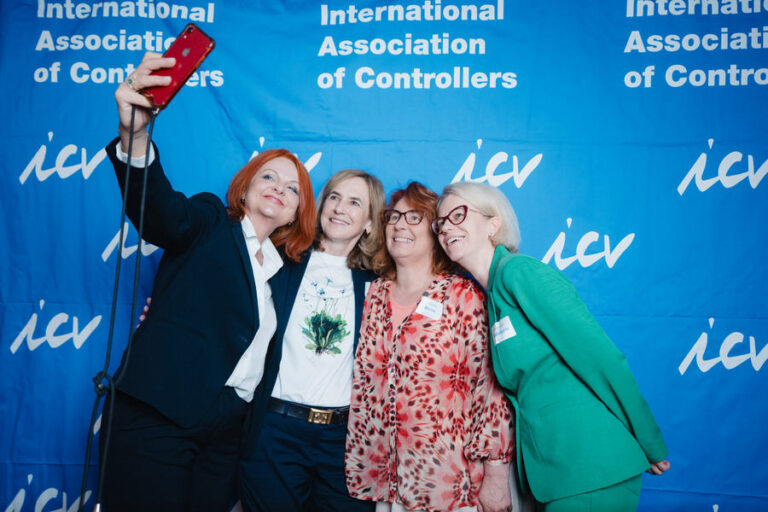
The ICV – Péter Horváth Newcomer Award. For the Award-worthy nextgen in controlling
With the ICV – Péter Horváth Newcomer Award, we would like to specifically promote the next generation of academic controllers and bring fresh, innovative ideas from the university into practice. After all, controlling thrives on new impulses – and this is exactly where we come in! The Award offers you as a student a unique platform to present your research to a specialist audience. Together we will make your outstanding academic work visible and bring practical concepts developed by you to companies. In this way, not only you as the Award winner benefit, but the entire controlling community.
Invitation to participate in the competition for the ICV – Péter Horváth Newcomer Award

Dear professors,
dear authors of the theses,
the International Association of Controllers (ICV) and the Péter Horváth Foundation (PHS) praise the
ICV – Péter Horváth Newcomer Award.
The aim of the ICV – Péter Horváth Newcomer Award is to promote the next generation of academic controllers and to transfer innovative and practicable ideas from the university to controlling practice, thus making them accessible to a broad controlling community.
Awards will be given for three master theses or outstanding bachelor theses that address both controlling innovations and classic controlling topics in application. It is also desired that the authors of the submitted theses deal with the ICV basic positions and their critical discussion.
The call for entries includes work submitted to a European university after April 30, 2023 .
The ICV – Péter Horváth Newcomer Award 2025 is open to both the supervising professors and the authors of the theses. We would like to invite you to submit Award-worthy theses to us with the complete application documents. The deadline for submissions is May 15, 2025, and the submitted theses can cover the entire spectrum of controlling and be written in German or English.
For the Jury – consisting of practicing controllers and university representatives – the scientific nature, the degree of innovation and the derivability of implications for controller practice are the focus of their decision.
The ICV – Péter Horváth Newcomer Award is funded by the Péter Horváth Foundation with a total of EUR 12,000 sponsored. In addition, the Award winners receive a personalized digital badge for free use and a free ICV membership for one year, which also includes a subscription to Controller Magazin.
The Award ceremony for the ICV – Péter Horváth Newcomer Award will take place at the ICV conference in Berlin on October 18, 2025. We hope that the Award winners and their supervising professors will make their work available to a wide audience for the various ICV media.
We look forward to your participation and are excited about innovative and practicable controlling ideas.
Let’s support the next generation together!
Yours sincerely
| Matthias von Daacke Vice-Chairman of the ICV Management Board |
Prof. Dr. Reinhold Mayer PHS Foundation Board of Directors |
Prof. Dr. Christoph Binder Jury Chairman |
Award winners
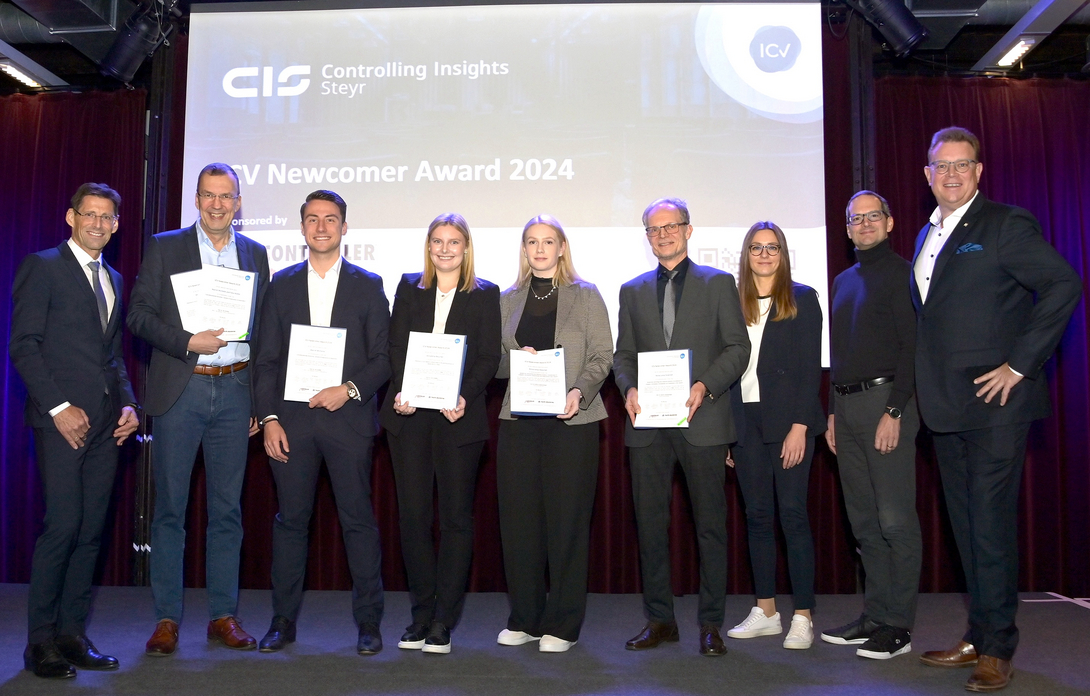
From left to right: Prof. Dr. Heimo Losbichler (ICV), Prof. Dr. Utz Schäffer (WHU), Marcel Michalik (3rd place), Annalena Beuchel (1st place), Anna-Lena Osterloh (2nd place), Prof. Dr. Ralf Schlemminger (Bremen University of Applied Sciences), Nina Lantin (Henkel), Dr. Hannes Schollenberger (Henkel) and Matthias von Daacke (ICV).
Photo: Peter Kainrath
Annalena Beuchel was awarded the ICV Newcomer Award 2024 for her master thesis on planning in a VUCA world. Laudator Matthias von Daacke, Vice-Chairman of the Board of the International Association of Controllers (ICV), presented the Award at the end of November as part of the ICV’ controlling conference, CIS Controlling Insights Steyr.
With this Award, sponsored by Haufe Akademie and Controller Magazin, the ICV focuses on innovative and practice-relevant solutions from the ranks of young controllers at universities. The range of topics covered by the three Award-winning works extends from VUCA to change and stakeholders.
Annalena Beuchel impresses with “Planning in a VUCA World”
The master thesis “Planning in a VUCA World: A Critical Review of the Planning Process of Henkel AG & Co. KGaA”, which the Jury found outstanding, deals with planning in volatile and uncertain business environments. The first-place winner had the opportunity to analyze the planning process of a large, globally active company at Henkel AG & Co. KGaA in detail and to highlight the weak points against the background of the current VUCA environment. On this basis, it shows the need for action to make planning more flexible and agile.
Annalena Beuchel works out the challenges of transforming the planning process into a Beyond Budgeting approach and develops innovative and practical solutions, which she also critically reflects on. In addition to in-depth process-oriented considerations, the requirements in the areas of culture and leadership are also included. The Jury highly appreciates her very thorough, critical and at the same time solution-oriented approach: “Thanks to the structured approach, the well-founded analyses and the involvement of the relevant stakeholders, the work provides practical insights and a valuable contribution for companies that want and need to adapt their planning processes to the dynamics and uncertainty of today’s business world,” says laudator Matthias von Daacke enthusiastically, attesting to the Award winner: “You have driven forward an extremely topical and important topic with commitment.
Annalena Beuchel’s master thesis at WHU – Otto Beisheim School of Management was supervised by Prof. Dr. Utz Schäffer.
Anna-Lena Osterloh focuses on the transformation of controlling
In her bachelor thesis “Transformation of controlling through business analytics: changing tasks, instruments, competencies and organization in the future”, Anna-Lena Osterloh sheds light on the effects of business analytics (BA) on controlling – a topic of central importance for the further development of controlling, as Matthias von Daacke emphasized in his laudatory speech. The runner-up of the ICV Newcomer Award 2024 shows how traditional tasks can be optimized through BA and how controllers can become agile, data-competent decision-makers. Controlling can develop even more into a forward-looking function and react more agilely to developments, particularly through predictive analytics. Von Daacke thanked Osterloh for “the valuable impetus for the future of controlling in the age of business analytics”.
Anna-Lena Osterloh’s bachelor thesis was supervised by Prof. Dr. Ralf Schlemminger from Bremen University of Applied Sciences.
The development of stakeholders at Marcel Michalik and Felix Möller
The master thesis “Controlling Business Partnering – Evolution of the Expectations of Stakeholders” analyzes the expectations of controllers in their role as strategic co-pilots. Based on interviews and data analyses, the authors have created a target image for the future of controllers and, in collaboration with Covestro AG, identify challenges in the areas of people, data and processes. “This impressive work represents a significant contribution to the further development of the controlling profession and shows the steps for the successful transformation of controllers into strategic business partners,” was the conclusion of the Award Jury, presented by laudator von Daacke.
The master thesis by Marcel Michalik and Felix Möller was supervised by Prof. Dr. Utz Schäffer from WHU – Otto Beisheim School of Management.

From left to right: Prof. Dr. Heimo Losbichler (ICV Chairman of the Board), supervisor Prof. Dr. Utz Schäffer (Director Institute of Management Accounting and Controlling at WHU – Otto Beisheim School of Management), Award winners Shawn Pauer and Erik Lüerß, Matthias von Daacke (ICV Vice-Chairman of the Board) and Jochen Fellhauer and Christian Walter, both from the supervising company SAP AG. Photo: Peter Kainrath
Steyr, Austria, November 24, 2023 – Shawn Pauer and Erik Lüerß are the winners of the ICV Newcomer Award 2023. The winning duo was honored for their work entitled “Success Factors in the Implementation of Machine Learning Algorithms in Financial Forecast Processes” at the ICV Autumn Conference CIS Controlling Insights Steyr. “You have made a valuable contribution with your research and provided an important insight into the successful implementation of machine learning in financial forecasting,” said laudator and Vice-Chairman of the ICV Executive Board Matthias von Daacke, announcing the Jury’s decision.
The two students from WHU – Otto Beisheim School of Management were guided through their bachelor thesis by Prof. Dr. Utz Schäffer and Prof. Dr. Marko Reimer, who, like the Jury, recognized the potential of the chosen topic, because “although the advantages of machine learning are obvious to most managers in business, its application in financial forecasting often falls short of expectations,” the ICV Newcomer Award Jury agreed. The Jury is made up of representatives from theory and practice in controlling: Jury Chairwoman Prof. Dr. Nicole Jekel, Prof. Dr. Susann Erichsson and Prof. Dr. Solveig Reissig-Thust are professors at the Berlin School of Engineering and the Berlin School of Economics and Law respectively; Gunnar Elbers is a partner at CTCon GmbH in Düsseldorf; Christina Keindorf is Head of Group Controlling at Deutsche Bahn AG. As always, the Jury attached great importance to the four aspects of scientific foundation, practical relevance, direct practicability and degree of innovation when making its decision in 2023.
Successful implementation of machine learning requires active management of critical factors
Among the eight entries in the running for the ICV Newcomer Award 2023, the work of Shawn Pauer and Erik Lüerß was also convincing because, in addition to thorough literature research and a comprehensive case study with 16 expert interviews at SAP AG, they also developed their own best practice model. This offers 18 guiding success factors in the four dimensions of goal and scope, tool, employees and culture, and process. They help companies to decide on the most promising implementation of machine learning in their own financial forecasts. “Instead of focusing on the technical perspective, your work analyzed the business implications and challenges for change management when introducing machine learning in financial forecasting,” said the Jury, praising the winning team’s approach to the topic. After all, it is only by actively managing the critical factors for successful implementation that the benefits of machine-learning-based forecasts can be fully exploited – greater accuracy, avoidance of cognitive bias, better alignment, greater timeliness and increased cost efficiency.
Austria’s top 500 companies contribute insights to Daniel Mitterlehner’s work
Daniel Mitterlehner secured second place in the ICV Newcomer Award 2023 with his master thesis “The future topics of controlling in large Austrian companies”. The student from the University of Applied Sciences Upper Austria Steyr was guided through his master thesis by Thomas Rockenschaub. The thesis focused on a survey of the top 500 companies in Austria with the highest turnover – with a response rate of 37 percent. The Jury summarized that the thesis was of an overall high quality, in tune with the times and also provided meaningful results, and: “Your ability to incorporate current literature and comparable studies into your work and to draw a clear picture of the future of controlling in Austria is particularly impressive”. It is no coincidence that the thesis has already been considered for publication in the specialist journal “Controlling and Management Review”. The team of experts agreed in their assessment that this level of attention for a master thesis is exceptional and therefore all the more impressive.
Antonia Schukraft puts Integrative Performance Management into practice as a three-stage cycle
Antonia Schukraft, who came third, focused on integrative performance management. She examined this using the example of the development division of Magna PT B.V. & Co KG. Her bachelor thesis, supervised by Prof. Dr. Roman Stoi from the Baden-Württemberg Cooperative State University in Stuttgart, is about combining the Balanced Scorecard (BSC) with Objectives & Key Results (OKR) to create an integrated performance management system. This enables a systematic and multi-stage implementation of vision and strategy as well as agile tracking of set targets. “Antonia Schukraft translates vague visionary ideas into concrete short-term goals with a three-stage performance management cycle, which are operationalized via OKRs and implemented iteratively over the course of the year”. The Jury is just as impressed by this as it is by the practical testing in the development department of automotive supplier Magna and the associated in-depth examination of the content of adequate OKR sets as well as the visualization and implementation of corresponding reporting. “Your work clearly shows that the cyclical combination of BSC and OKR allows both the strategic goals to be implemented in a structured manner and the derived objectives and key results to be tracked throughout the year,” said the Jury, summarizing the result.
Unfortunately, Antonia Schukraft and her supervisor were unable to attend the Award ceremony in person due to illness.
ICV thanks students and university representatives for looking beyond theory
Laudator Matthias von Daacke was impressed by the topics of the finalists. During the Award ceremony, the Vice-Chairman of the ICV Board pointed out the importance of intensive exchange with universities and other educational institutions in order to continuously develop controlling. The ICV sees itself as a mouthpiece and representative of controlling practice. He thanked both the students, who develop innovative scientific solutions for practical problems in management accounting during their studies, and the professors, who maintain a practical focus in their teaching and research. This was the only way to ensure the breadth that could once again be seen in the submissions for this year’s ICV Newcomer Award: with work ranging from driver-based planning and design thinking to EU taxonomy, the students once again covered many interesting topics.

The ICV Newcomer Award 2022 goes to Ayse Kötemen. The graduate of the University of Duisburg-Essen (Mercator School of Management) has identified the key challenges for the successful implementation of predictive analytics applications in controlling. ICV Vice-Chairman of the Board Matthias von Daacke presented the Award virtually and acknowledged the Award winner’s extraordinary commitment in his laudatory speech: she used 193 high-quality observations for her empirical analysis.
The starting point for her work entitled “Use of Predictive Analytics in Controlling – An Empirical Analysis” was the realization that many controlling projects in the area of predictive analytics (PA) fail, reported Kötemen in her presentation, which she and the two other finalists gave at the ICV Autumn Conference CCS Controlling Competence Spaces. Kötemen emphasized that PA applications are a great opportunity for controlling to successfully process the increase in mass data through big data and thus enable improved, data-driven decision support for management. Ayse Kötemen got to the bottom of the reasons for the high degree of failure of these applications in controlling in her analysis. According to her analysis, insufficient data quality, a lack of expertise in the area of predictive analytics and a lack of support from top management are the main challenges. With these findings, Ayse Kötemen, who now works as Head of Finance & Procurement at the Rhine-Ruhr-Wupper Chemical and Veterinary Investigation Office, has created clear instructions for the successful implementation of predictive analytics in controlling, said Matthias von Daacke, praising the winner of the ICV Newcomer Award 2022, whose thesis was supervised by Prof. Dr. Marc Eulerich.
Criteria for the ICV Newcomer Award? It must be scientifically sound, relevant, practicable and exciting!
At the beginning of the Award ceremony, which took place online as part of the 20th CCS Controlling Competence Spaces, Christina Keindorf summarized once again what the Jury looks for when selecting the finalists in the competition for the Award. According to the Head of Group Controlling at Deutsche Bahn, it is always about the scientific basis paired with the practical relevance of the question. Just as important to the Award Jury, of which Keindorf is a member, is the direct practicability of the concepts developed and the degree of innovation of the theses. But that’s not all. “Finally, it should also be exciting for you to come to our controlling conference today to be inspired by the topics of the ICV Newcomer Award”.
“Every controlling employee can directly deduce the need for action and initiate implementation”
With this in mind, Christina Keindorf gave the laudatory speech for third-placed Frederick Thönig. He dedicated his master thesis to the topic of “Increasing efficiency in accounts receivable management with the help of robotic process automation: a process analysis using the example of Reiss Kälte-Klima GmbH & Co. Thönig’s thesis builds on the work of the ICV Working Capital Management and Robotic Process Automation (RPA) specialist groups. Using an inductive approach, the graduate of the CBS International Business School in Mainz examined the extent to which RPA automation as a software tool contributes to increasing efficiency in the financial sector. He was supervised by Prof. Dr. Mike Schulze. Christina Keindorf reported that the Jury was impressed by the highly practical nature of the paper: “Every controlling employee can draw direct conclusions about the need for action and initiate implementation!” Frederick Thönig is now Commercial Manager at Reiss Kälte-Klima GmbH & Co.
Individual information behavior influences decision-making preparation and processes: Junior speaks first!
The runner-up in the competition for the ICV Newcomer Award 2022 is Kea Wassermann from the Graduate School of the Nordakademie. As part of her master thesis, she focused on controlling itself as the object to be examined and thus developed a completely new perspective. She investigated the extent to which human information behavior influences decision preparation and decision-making processes. During the extensive research for her qualitative-empirical study, Wassermann identified a number of cognitive distortions, which she presents a concept of debiasing measures to overcome. These include the “junior speaks first” idea: the person with the lowest status expresses their opinion first in meetings. Decision trees, which help to reduce complexity and formalize decision-making processes, are another directly implementable idea that Kea Wassermann presents in her work, along with a number of other tips and tricks. “I’m sure we’ll be reading about it in one journal or another!” said ICV Managing Director Carmen Zillmer, who was delighted with the successful mix of theory and practical relevance of the thesis with the official title “Rationality assurance in controlling with special consideration of cognitive distortions and debiasing measures”. This was supervised by Prof. Dr. Hanno Drews. Kea Wassermann now works as Commercial Policy & Pricing Officer Health Systems at Philips GmbH Market DACH.
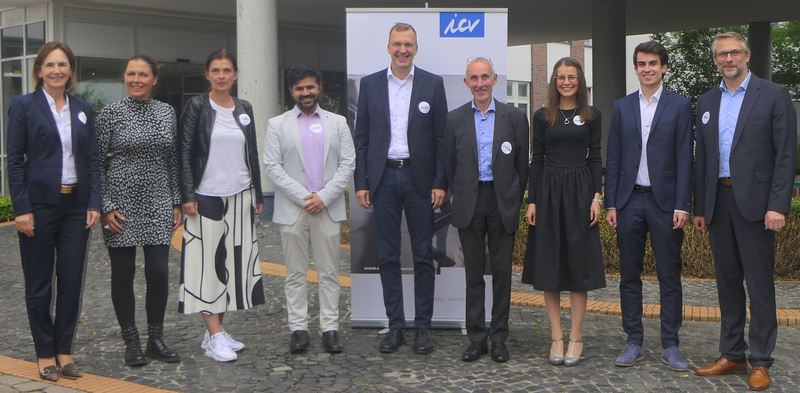
From left to right: Carmen Zillmer, ICV Managing Director; Prof. Dr. Nicole Jekel, Jury Chairwoman, Professor at Beuth University of Applied Sciences, Berlin;
Christina Keindorf, Jury Member, Corporate Controlling Deutsche Bahn; Ali-Rabab Qureshi, Winner ICV Newomer Award 2021; Prof. Dr. Utz Schäffer, University Supervisor Masterand Qureshi, Director of the Institute of Management and Controlling at WHU – Otto Beisheim School of Management, Vallendar; Ralf Leitermann, Practice Supervisor Masterand Qureshi, Head of Risk and Internal Control at thyssenkrupp Steel Europe AG; Helen Denninger, Award runner-up; Niklas Werle, Award third-place winner; Prof. Dr. Marko Reimer, University Supervisor Niklas Werle, WHU – Otto Beisheim School of Management, Vallendar
The ICV Newcomer Award 2021 goes to Ali-Rabab Qureshi (pictured) from WHU – Otto Beisheim School of Management for his master thesis “Developing an Early Warning System to Improve Proactive Risk Management in Non-Financial Companies”. This makes it a triple winner among the ICV Award for the next generation of controllers. Its graduates had already received the Award in 2018 and 2019, which has been presented by the International Association of Controllers and sponsored by Haufe and the Haufe Akademie since 2007.
Optimal early warning as a matter close to the winner’s heart
“The concept of early warning systems is very close to my heart,” says Qureshi, explaining the choice of topic for his master thesis, which he saw confirmed by another challenge: “There is very little practical information on this. The winner has overcome this shortcoming. In addition to an exciting mix of theory and practice, his master thesis has enabled him to develop an individual methodology that replaces a generally accepted approach. In doing so, Ali-Rabab Qureshi identified two strands that have a significant influence on the successful implementation of an early warning system: the right understanding of suitable indicators and awareness of them within the organization. The Award winner has therefore designed a model that answers the question of whether an organization is ready to implement an early warning system.
thyssenkrupp Steel Europe is also delighted to have won the Award
The Award-winning master thesis on risk management was supervised and submitted for the ICV Newcomer Award 2021 by Prof. Dr. Utz Schäffer, Director of the Institute of Management and Controlling at WHU – Otto Beisheim School of Management, Vallendar, because: “The topic of early detection is more important than ever. Ali-Rabab Qureshi has developed a very good, practical solution in his master thesis despite the difficult conditions during the pandemic. Congratulations and a big thank you to Ralf Leitermann from thyssenkrupp Steel Europe for his dedicated support of the project.” Ralf Leitermann, who supervised the master student Ali-Rabab Qureshi at the company, is Head of Risk and Internal Control at thyssenkrupp Steel Europe AG. His experience of more than ten years in controlling and from the establishment of risk identification, assessment and monitoring processes at thyssenkrupp has been incorporated into the Award-winning work. The experienced practitioner was very moved by the Award. This also became clear at the Award ceremony and the subsequent joint presentation on September 18 at the ICV Nord-Ost conference in Schwerin: “I am still touched with joy and pride when I think about the fact that the thesis of my master student and friend Ali-Rabab Qureshi was awarded an A at WHU – Otto Beisheim School of Management. When it became 1st place at the ICV, the joy increased immensely, not only for me but also in our company.”
“Making modern budgeting agile” achieves 2nd place
2nd place for the ICV Newcomer Award 2021 goes to Helen Denninger from the Baden-Württemberg Cooperative State University (DHBW) Stuttgart. She dedicated her bachelor thesis to the topic of “Designing modern budgeting in an agile way using the example of Magna PT B.V. & Co. She was supervised by Prof. Dr. Roman Stoi. Helen Denninger shows how the planning process can be structured efficiently and with added value in times of digitalization and growing global markets. She describes a toolbox that can be customized for companies according to their environment and business model. The focus is on business processes, but above all on the customer and the human factor instead of cost centers, cost units and cost type planning. “The intensive and vivid examination of the practical implementation of her thesis deserves special mention – a work that we as a Jury not only read with interest, but which also gave us a lot of inspiration for our own work,” praised Jury member Christina Keindorf, Group Controlling Deutsche Bahn, and: “I am looking forward to your master thesis!”.
3rd place for the optimal integration of shared services in controlling
“Shared Service Centers (SSCs) as an Efficiency Driver in Controlling – how to integrate SSCs in Henkel’s Finance Function?” takes 3rd place in the ICV Newcomer Award 2021. Niklas Werle took on this topic, accompanied by Prof. Dr. Marko Reimer from WHU – Otto Beisheim School of Management, Vallendar. In his work, Werle outlines the conditions under which shared services, which are particularly popular with large companies “but are not always success stories”, can also provide complex controlling services, summarizes Jury member Christina Keindorf. In addition to the “impressive number of literature sources” that Niklas Werle has processed and brought together, the Jury was also impressed by Henkel’s empirical use cases, which clearly illustrate the success factors and stumbling blocks of shared services in the area of controlling and their integration into the company’s finance function. Christina Keindorf’s tip: “An absolute recommendation to all practitioners who are concerned about the optimal structural integration and coordination of shared services in controlling!”.
Thanks to the lecturers for fostering practical relevance
Jury chair Nicole Jekel, professor at Beuth University of Applied Sciences, Berlin, thanked all students who took part in the competition at the Award ceremony during the ICV North-East Conference in Schwerin on September 18. For the ICV as a mouthpiece and representative of controlling practice, the intensive exchange with universities and training institutions is enormously important. With the Newcomer Award, the ICV is therefore recognizing the achievements of young talents who develop innovative scientific solutions for practical controlling tasks during their studies.
Jekel thanked the other Jury members Solveig Reissig-Thust, Professor of Controlling at the Berlin School of Economics and Law (HWR), Gunnar Elbers, Partner at CTCon GmbH Düsseldorf, and Ute Schröder from the Controlling Benchmark Circles – but above all the professors who accompany the students. “It is important for controlling practitioners that they not only deal with theoretical concepts and methods during their training, but also with their practical application and the resulting problems”. This is precisely what the professors ensure by maintaining a practical focus in their teaching and research.

The winner of the ICV Newcomer Award 2020: Jesper Juul.
The ICV Newcomer Award 2020 goes to Jesper Juul (photo) from the Berlin School of Economics and Law for his master thesis entitled “The application of performance metrics in earn-out provisions”, supervised by Prof. Dr. Thomas Gruber. Second place was awarded to the joint work of Christoph Beis and Andreas Friedrich from the Stockholm School of Economics for their master thesis “The Data Scientist: A Cockoo in the Management Accountant’s Nest?”, supervised by Prof. Dr. Lukas Goretzki. Manuel Mandl took third place with his thesis “Use cases and implementation of manufacturing execution systems data in a process mining application”, supervised by Matthias Regier and Prof. Dr. Gunther Friedl at the Technical University of Munich.
1st place for master thesis on “Buying and Selling” – “Mergers & Acquisitions”
The laudatory speech for the winner was given by the ICV Head of the Jury Prof. Dr. Nicole Jekel:
“The Award is hot! It’s about buying and selling, about mergers & acquisitions. If you want to sell a company, then you are certainly asking: How much money will I get for my company? Sellers want to get as much money as possible. Buyers, on the other hand, naturally want to get everything as cheaply as possible at a sustainable value. Specifically, 1st place is about earn-outs – i.e. contractual agreements – in the context of corporate transactions that make part of the purchase price dependent on the future performance of the sold company over a fixed period of time.
What do mergers and acquisitions have to do with controlling? Quite a lot! In particular, it is about providing business management advice on corporate decisions. Quite simply, it is about making rational decisions. And little research has been done in this context to date.
In concrete terms, everything revolves around performance measurement: EBIT or EBITDA usually comes first, sales second, followed by sustainable company values through to non-financial measures of success. We know that the choice of performance measurement can play an immense role in terms of both information content and potential manipulation. If we want to sell a company then – as the northern Germans say: “the bride is adorned”. So how do I decorate a bride? In order to boost sales figures, for example, short-term actions can be initiated, but in the long term these could actually be detrimental to the company.
The winner of the 1st place has done a lot of work. In addition to in-depth literature research, four hypotheses were tested with the help of 65 interviews. Both sellers and buyers were interviewed. I’m already looking forward to seeing what concrete insights and tips we will gain from these contractual arrangements in corporate transactions.
For this reason, we have awarded first place to Jesper Juul with his master thesis on “The application of performance metrics in earn-out provisions” from the School of Business and Law, supervised by Prof. Dr. Thomas Gruber.”
2nd place for master thesis “Data Scientist: A Cockoo in the Management Accountant’s Nest?”
The laudatory speech for 2nd place was given by Jury member Ute Schröder:
“2nd place goes to Christoph Beis and Andreas Friedrich from the Stockholm School of Economics for their master thesis “The Data Scientist: A Cockoo in the Management Accountant’s Nest?”, supervised by Prof. Dr. Lukas Goretzki.
All of us on the Jury already had a lot of fun with the title and immediately started discussing whether the data scientist would replace the “classic management accountant” and make them superfluous. And it is precisely this question that the master thesis deals with in detail. Christoph Beis and Andreas Friedrich have worked out very well that the exact tasks and role of the “data scientist” in companies is not clearly described and is often interpreted very differently. Therefore, their clear recommendation is first of all to sharpen the role definition and also to clarify the organizational connection. Otherwise, a vacuum is created that can be used for internal power struggles and individual interpretations of the role.
Among other things, the data scientist should identify the business drivers, understand the data with the management and clean it up so that trends can be identified and a look into the future can be ventured via predictive analytics.
There are, of course, overlaps with accounting and controlling here. It is best to decide under the leadership of a team who has which tasks and how the boundaries to management can be sensibly drawn. In any case, all the companies surveyed and the students agree that the importance of data scientists and the digital analysis of data is becoming increasingly important and is growing rapidly. Those who build up and actively use this expertise will be able to increase their success as a company in the future. If controllers and accountants do not acquire this knowledge or do not work in a team with data scientists, their importance in the company as business partners will decline accordingly.
This expertise must therefore be promoted in all areas of the company and will also be required of the CFO of the future.”
3rd place for “Use cases and implementation of manufacturing execution systems data in a process mining application”
Professor Solveig Reissig-Thust gave the laudation for the third place winner:
“We awarded 3rd place to Manuel Mandl for his work on the topic of “Use cases and implementation of manufacturing execution systems data in a process mining applicati-on”. The work was supervised by Matthias Re-gier and Prof. Dr. Gunther Friedl at the Technical University of Munich.
Digitalization in controlling is an absolutely exciting and still highly topical field of research. It is therefore not surprising that numerous theses deal with this topic. Unfortunately, however, many only scratch the surface and stick to general statements. As a Jury, we were therefore particularly impressed by Mr. Mandl’s thesis. It very impressively demonstrates a concrete application example for data-based production controlling.
In his thesis, Mr. Mandl develops an application based on production data from an international group company. With the help of the innovative method of process mining, daily updated data from the production process can be obtained worldwide. The advantages for controlling are obvious – just think of the improved management, planning and control of production processes. We also found the presentation of the process visualization particularly interesting, which makes it possible to map the production process in real time and thus immediately identify deviations and inefficiencies.
Mr. Mandl’s work impresses on the one hand with its very detailed technical knowledge, but on the other hand also with its very systematic and easy-to-understand presentation. It thus makes an important contribution to research in the field of production data analysis. At the same time, it is of interest to all practitioners who are interested in increasing the efficiency and transparency of their production processes.”
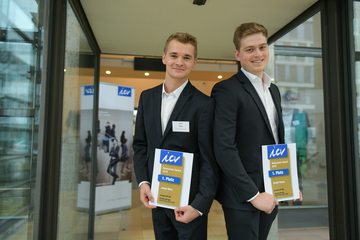
The ICV Newcomer Award 2019 for was presented in Berlin on November 16: 1st place goes to Daniel Braun and Jakob Merz from WHU – Otto Beisheim School of Management, Vallendar, for their master thesis: “Agile @ Controlling. How can Controlling Support Different Degrees of Agility in Organizations?”, supervised by Prof. Dr. Utz Schäffer; 2nd place goes to Gernot Domes from Carinthia University of Applied Sciences, Villach, for his master thesis: “The effects of digitalization in the context of Industry 4.0 on the functions of controlling using the example of local manufacturing companies”, supervised by Dr. Alexander Sitter; 3rd place to Anna Adem from the Baden-Württemberg Cooperative State University, Stuttgart, with her bachelor thesis: “Agile target costing in the semiconductor industry using the example of Infenion Technologies AG”, supervised by Prof. Dr. Roman Stoi.
Close connection between science, teaching and practice
The Head of the Jury, Prof. Dr. Nicole Jekel, Professor at Beuth University of Applied Sciences Berlin, presented the ICV Newcomer Award at the Controlling Inspiration Berlin – CIB 2019 symposium together with the Jury and the Vice-Chairman of the ICV Board, Matthias von Daacke. In her laudatory speech, Professor Jekel explained that “an intensive exchange with universities and other educational institutions is necessary for the practical development of controlling. With this in mind, we would like to use the Award to recognize the achievements of young talents who develop innovative scientific solutions for practical controlling problems during their studies.” She thanked all participating students and their professors for cultivating practical relevance in their teaching and research. “It is of great importance for controller practice that students not only deal with theoretical concepts and methods during their training, but also with their practical application and the resulting problems.”
Twelve participants from all countries in the DACH region submitted theses. These covered a wide range of topics, from traditional controlling instruments such as cost accounting and budgeting to risk management, agility and digitalization. In addition, the submitting institutions represented the entire spectrum of higher education institutions, which, according to Professor Jekel, speaks for the broad acceptance of the Newcomer Award in the higher education landscape.
Jury members honor the winning entries
The Jury, chaired by Prof. Dr. Nicole Jekel, consists of: Gerhard Radinger, trainer at the CA Controller Akademie; Dr. Walter Schmidt from Berlin, who has been involved in the ICV on a voluntary basis for many years; Christina Keindorf, Head of Group Controlling DB Group (CC), also Head of Controlling Group/Service Functions (CCH) as well as Managing Director Usedomer Bäderbahn, Chief Financial Officer DB Barnsdale AG, Managing Director DB Competition Claims GmbH, and Ute Schröder from the Controlling Benchmark Circles.
As in previous years, the Jury applied fixed criteria when making its decision: In addition to the scientific basis, the decision was primarily based on the practical relevance of the issue, the direct practicability of the concepts developed, the degree of innovation of the theses and the conformity of the theses or their critical discussion to the ICV basic positions.
Jury Member Gerhard Radinger held the laudatory speech for the 3rd place winner: Anna Adem from the Baden-Württemberg Cooperative State University with her bachelor thesis “Agile target costing in the semiconductor industry using the example of Infenion Technologies AG”, supervised by Prof. Dr. Roman Stoi.
The work is a good mixture of theory and practice, a combination of controlling classics (target costing) and modern topics (agility). An independent and innovative concept for agile target costing in the semiconductor industry has been developed here. The practical part of the work is particularly convincing due to the detailed analysis of the situation in the training company and the exemplary implementation of the concept developed in a specific chip development project, which has shown measurable success. The innovative approach consists of linking the classic target-costing process with agile methods of organization and project management. This makes it possible to incorporate success-relevant needs and the customer’s willingness to pay right from the start of product development. According to the “fail-early principle”, initial development results can be evaluated iteratively in order to adapt them quickly and flexibly if necessary, taking into account the costs permitted by the market and customer requirements.
Juror Christina Keindorf gave the laudatory speech for the 2nd place winner: Gernot Domes from the Carinthia University of Applied Sciences, Villach, with his master thesis “The effects of digitalization in the context of Industry 4.0 on the functions of controlling using the example of local manufacturing companies”, which was supervised by Dr. Alexander Sitter.
The work uses empirical studies to answer the question of the extent to which local manufacturing companies are prepared for the changes in the functions and areas of responsibility of controlling in the course of advancing digitalization and Industry 4.0. This problem is based on an existing maturity model for digital transformation in controlling, which the author has independently expanded in order to derive concrete recommendations for action for manufacturing companies. “Mr. Domes thus combines theory and practice in an exemplary manner.”
Jury member Dr. Walter Schmidt honored the 1st place winner: A jointly submitted thesis by Daniel Braun and Jakob Merz from WHU – Otto Beisheim School of Management, “Agile @ Controlling. How can Controlling Support Different Degrees of Agility in Organizations?”, supervised by Prof. Dr. Utz Schäffer.
“The two authors have not only taken the trouble to organize the multitude of sometimes contradictory definitions of agility. They have also managed to capture the dual definition of agility – external expectations and internal principles of organization – in an intuitively understandable matrix. That in itself is a creative achievement that deserves special recognition. By combining both dimensions with the idea of flexibility, they create an agility framework into which the diverse aspects of managing companies and organizations can be classified,” says Dr. Schmidt. However, the authors have gone one step further by showing that agility is not an “all or nothing task”, but can be applied in a differentiated way to different content and organizational structures. “With their matrix, the two authors provide practical controllers with an easy-to-use tool for determining both the degree of agility requirements and the degree of their implementation,” says Dr. Schmidt. “I hope that this matrix will spread quickly. Only rarely are sound scientific knowledge and practical usability so close together.”
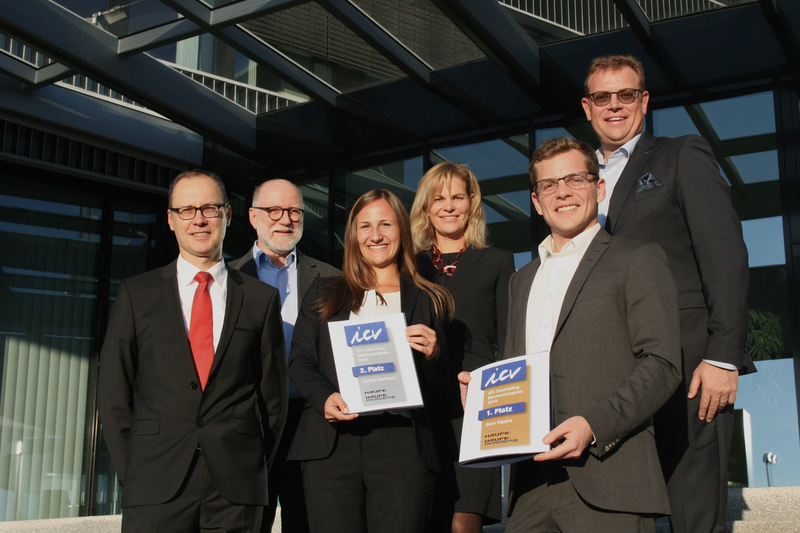
AwardGero Hippke (bottom right) is the winner of the ICV Newcomer Award 2018, followed by Kathrin Hermann (center) with her supervisor Professor Dr. Roman Stoi (left). The third place winner, Dominik Große, was unable to attend the Award ceremony in person. The Jury members Walter Schmidt (2nd from the left) and Ute Schröder as well as the Vice-Chairman of the ICV Board Matthias von Daacke congratulated him.
Gero Hippke from WHU Otto Beisheim School of Management is the winner of the ICV Newcomer Award 2018. With his thesis “Business Intelligence at Bayer: Improving decision-making in management and strengthening controlling”, he convinced the Jury, which was able to select from 14 submitted theses from all countries in the D-A-C-H region. The Award, which is endowed with 4,050 euros and sponsored by Haufe Verlag and Haufe Akademie, honors excellent theses by young controllers with the aim of promoting the next generation of academic controllers and transferring innovative and practicable ideas from university to controlling practice, thus making them accessible to a broad controlling community.
The ICV Newcomer Award was presented this year as part of the CCS Controlling Competence Stuttgart, the ICV Autumn Conference in southwest Germany. Walter Schmidt, Executive Adviser to the ICV Executive Board and member of the Jury, introduced the Award ceremony on November 22. He reported on the wide range of work submitted – from classic controlling instruments such as cost accounting and budgeting to risk management and sustainability controlling to role models in controlling. The submitting institutions also represent the entire spectrum of higher education institutions. “This speaks for the broad acceptance of the Award in the university landscape,” concluded Walter Schmidt, who also pointed out the criteria for the Award. These include practical relevance, direct practicability, but also the degree of innovation of the concept presented. The conformity of the work and its critical discussion of the ICV’s basic positions is always indispensable.
Walter Schmidt was finally able to announce the following candidates as finalists:
3rd place: Dominik Große from the Otto Friedrich University of Bamberg. Title of his master thesis: “Stochastic scenario planning as a risk-oriented planning method for controlling – potentials and challenges”. He was supervised by Prof. Dr. Dr. (habil.) Wolfgang Becker. Dominik Große focused on a planning method that can specifically take account of increasing uncertainty. With stochastic scenario planning, statistically assessed risks are integrated into the planning process and the future is illustrated by a risk-adjusted development corridor. Walter Schmidt praised Große’s work with a quote from the Greek politician and general Pericles: “The important thing is not to predict the future, but to be prepared for the future” – “and your master thesis makes a valuable contribution to this!” concluded Schmidt.
Walter Schmidt’s colleague on the Jury, Ute Schröder from the Controlling Benchmark Circles, then presented the other finalists and the winner:
2nd place: Kathrin Hermann from the Baden-Württemberg Cooperative State University Stuttgart. Title of her bachelor thesis: “Concept of the Application of Digitalization Tools in the Finance Function – using the example of Robotic Process Automation at MANN + HUMMEL Group”. Kathrin Hermann was supervised by Prof. Dr. Roman Stoi. According to the thesis, “Robotic Process Automation” – RPA for short – will find its way into all finance functions. As part of the thesis, she not only analyzes the benefits and opportunities of this development, but also addresses the question of what obstacles need to be overcome and to what extent the role of the controller needs to change to become an IT architect and data scientist. “Kathrin Hermann not only deals with a highly topical and exciting subject. She is also taking the first step into practice. That’s what we’re all about at the ICV: bringing theory and practice, specialist knowledge and expertise together. We would therefore like to congratulate you on your bachelor’s thesis and look forward to your master thesis,” said Schröder to the runner-up at the Award ceremony.
The winner of the ICV Newcomer Award 2018 is Gero Hippke from WHU – Otto Beisheim School of Management. He was supervised by Prof. Dr. Utz Schäffer. The title of his thesis is “Business Intelligence at Bayer: Improving management decision-making and strengthening controlling”. Ute Schröder emphasized that Gero Hippke had succeeded in covering the core topics and management-relevant areas in controlling: Providing information and forecasting with the aim of making even better decisions. The Award winner explained this process of the automated business intelligence solution using the example of Bayer AG. The principles of such “Agile BI” go beyond the area of software with the aim of achieving general operational and organizational agility in order to be able to act flexibly, efficiently and quickly in the market. “The topic is current, interesting and currently a hot topic in many companies,” summarized Ute Schröder, and: “Mr. Hippke illustrated the challenges and important steps in the introduction of agile BI systems and tools well, from consolidation to IT systems to cultural management.”

In the picture, from left to right: Prof. Dr. Nicole Jekel, Beuth University of Applied Sciences Berlin, Jury Chairwoman; Ute Schröder, C4B-Team-GmbH & Co.KG, Jury member; Gerald Weißensteiner, Graz University of Applied Sciences, 2nd place winner; Gerhard Radinger, Controller Akademie AG, Jury member; Alexandra Knefz-Reichmann, Graz University of Applied Sciences, supervisor of Gerald Weißensteiner; Dr. Walter Schmidt, ask-Schmidt, Jury member; Matthias von Daacke, BLANCO GmbH & Co. KG, ICV Board Member; Fabio Britz, Technical University of Kaiserslautern, 3rd place winner; Prof. Dr. Hans Schmitz, Beuth University of Applied Sciences Berlin; the 1st place winner Doreen Semper, Beuth University of Applied Sciences Berlin, was not present. Prof. Schmitz accepted the Award on her behalf and also presented the Award-winning work. Photo: Cathrin Bach, concept and image
On November 18, 2017, the International Association of Controllers (ICV) presented the ICV Newcomer Award 2017 at its symposium “17th Controlling Innovation & Inspiration Berlin – CIB 2017”.
First place went to Doreen Semper from Beuth University of Applied Sciences Berlin for her work “Employee management in the customer service center illustrated using the example of an inbound project”, supervised by Prof. Dr. Hans Schmitz.
Second place went to Gerald Weißensteiner from the Graz University of Applied Sciences, Campus 02, majoring in Accounting and Controlling, with his bachelor thesis “Selection of possible KPIs and design of a KPI cockpit using the example of WO&WO Sonnenlichtdesign GmbH & Co. KG”, supervised by Alexandra Knefz-Reichmann and reviewed by Prof. Dr. Michl.
Third place went to Fabio Britz from the Technical University of Kaiserslautern for his master thesis “Transfer pricing between management and taxation: clarification of conflicting objectives based on a case study”. The thesis was supervised by Florian Beham and reviewed by Prof. Dr. Volker Lingau.
“Excellent success in illustrating the value chain and defining process indicators”
In her laudatory speech, Jury member Ute Schröder from the Controlling Benchmark Circle explained that the first place winner’s thesis was an outstanding success in illustrating the value chain and defining process indicators in a company. She justified the Jury’s decision with the current challenges posed by digitalization: “The digital transformation is shaking companies to their very foundations in some cases – and the tasks and role of the controller are not unaffected by this. Digitalization will also radically change controlling. The Jury agreed that in future it will be increasingly important to get to know the company processes and the value drivers in the company through an ACTUAL data analysis. This means first mastering and understanding big data with the actual data. For this reason, we have awarded our first place to Doreen Semper.”
Commenting on the Award-winning work, she said: “We were very impressed by the approach. External data and benchmarks were used and every step of the process was clearly recorded and intensively coordinated internally with those involved through queries. Furthermore, there was very close communication between the IT department and Controlling. Here, a young junior controller actively dealt with the company processes and presented them transparently in a practical manner.” This enabled the company to set up a control system on which a monetary incentive system is based as a logical consequence. “We discussed a lot in the Jury whether the employees were involved enough in finding the right key figures and the remuneration linked to performance. We found this point very important,” the juror continued. “In particular, the evaluation after three months, in which methodological weaknesses and satisfaction with the new incentive system were also queried once again, gave us a positive and lasting assessment. This evaluation also led to further corrections being made within the company.”
Key Performance Indicators & Transfer Prices
The work of the 2nd place winner (Gerald Weißensteiner, Graz University of Applied Sciences, “Selection of possible KPIs and conception of a KPI cockpit using the example of WO&WO Sonnenlichtdesign GmbH & Co. KG”) deals with the development of key performance indicators (KPIs). Using the example of a real company, and according to the Jury “well comprehensible”, the questions of which selection steps make sense, which evaluation criteria were used, which data is required and which advantages and disadvantages the selected KPIs have are dealt with. Juror Dr. Walter Schmidt, Executive Advisor to the ICV Executive Board: “A key point for the Award of his work lies in the focus on the purpose of key figures that are to be used for the management of a company. He points out, for example, that the sole recording of a situation using a quantitative key figure without the aid of qualitative information could be problematic and, in the worst case, lead to wrong decisions”. ICV Board Member and Jury Member Dr. Schmidt: “Key figures should help controllers to identify potential for improvement and proactively incorporate them into the management process. This is the position of the International Association of Controllers (ICV).”
“Taxes are something other than taxes!” explained juror Gerhard Radinger in his laudatory speech for the 3rd place winner. “Fabio Britz’s work could be reduced to this short denominator. The purpose of so-called inter-company settlements is to avoid fiscal sanctions such as double taxation or penalties, but also to optimize the tax burden of internationally active groups.” In his excellent master thesis, “Transfer pricing between management and taxation: clarification of conflicting objectives based on a case study”, Fabio Britz shed theoretical light on the “conflicting objectives between tax and taxation that are difficult to bridge” and also “substantiated them numerically” with a case study. Radinger continues: “The thesis combines an exciting and socio-politically topical subject for controllers in an excellent way.”
Scientific basis, practical relevance, feasibility, degree of innovation
This year’s Jury for the Newcomert Award, chaired by Prof. Dr. Nicole Jekel, consisted of Christina Keindorf, Deutsche Bahn AG, Gerhard Radinger, Trainer CA Controller Akademie, Dr. Walter Schmidt, Executive Advisor to the ICV Executive Board, and Ute Schröder, Controlling Benchmark Circle. The Jury met several times and held extremely critical discussions, reports Head of the Jury Prof. Jekel. 18 theses from all countries in the DACH region were submitted. These covered the entire spectrum from classic controlling instruments such as cost accounting and budgeting to risk management and sustainability controlling to role models in controlling. The submitting institutions also represented the entire university spectrum, which speaks for the high acceptance of the Newcomer Award in the university landscape.
The Jury applied the following criteria when making its decision: In addition to the scientific basis, the main focus was on the practical relevance of the issue, the direct practicability of the concepts developed and the degree of innovation of the theses. From 2018, the conformity of the theses and their critical discussion of the ICV basic positions will be assessed as a further criterion.
The ICV Newcomer Award is endowed with a total of over 4,000 euros and is sponsored by Haufe Verlag and the Haufe Akademie.
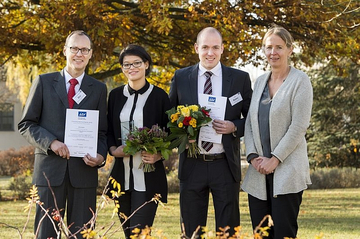
Winner of the ICV Newcomer Award 2016: Selina Rogers (2nd from left)
Combining finance and sustainability in reporting, taking risks into account in corporate planning, clarifying the controllers’ self-image as “partners of management” – the winning theses of this year’s ICV Newcomer Award are diverse. On Saturday, November 12, 2016, the International Association of Controllers (ICV) presented this year’s Award for the best theses on controlling at the WISTA Technology Park Berlin-Adlershof.
First place was given to Selina Rogers, Baden-Württemberg Cooperative State University, Stuttgart, for her work “Implementation of Integrated Reporting on the Example of Adidas”, second place went to Fynn Kohn, Kiel University of Applied Sciences, and third place to Dominic Danial Djannesari, WHU – Otto Beisheim School of Management, Vallendar.
“Winner has tackled a highly relevant topic”
The first place winner, Selina Rogers, wrote her bachelor thesis on the introduction of integrated reporting using the example of Adidas. The ICV Jury, chaired by Prof. Dr. Ute Vanini, Kiel University of Applied Sciences, justified its decision with the “convincingly clear formulation and definition of the problem” and a “very structured approach to the problem”. The work had addressed a topic that is highly relevant for practice and research, and the analysis was based on a comprehensive international literature review. In addition, concrete solutions for integrated reporting are developed for the company and documented in a comprehensible manner: “The approaches for integrating reporting can also be transferred to other companies in part,” says Professor Dr. Ute Vanini.
“Integrated reporting aims to link companies’ financial reporting with their sustainability reporting. The aim is to present a holistic picture of the company. The effect extends far beyond mere reporting: these integrated figures are also to be used to manage the company internally, making
adjustments to the target and controlling system necessary. Management must gain an understanding of the environment and the effects of its actions on it.
Risk management & controlling – controllers as “business partners”
The second place winner, Fynn Kohn from Kiel University of Applied Sciences, entitled his master thesis “Integration of risk management and controlling – development of scenarios and simulations to take risk aspects into account in the corporate planning of the ACO Haustechnik Group”. According to the ICV Jury, the thesis “demonstrates in a structured and application-oriented way the approaches and problems of using complex Monte Carlo simulations to integrate corporate planning and risk management in a medium-sized company”.
The third place winner, Dominic Danial Djannesari from WHU – Otto Beisheim School of Management, wrote his bachelor thesis entitled “Business Partnering in Practice – The relationship between Controllers’ roles and reporting practices”. This winner also addressed a very relevant topic, explained the Jury chairwoman. The empirical investigation into how the understanding of one’s own controller role affects the reporting of a company raises awareness of the topic, at least in the companies, and could offer starting points for a more conscious design of the controller’s role.
Record participation in 2016
The field of applicants for the ICV Newcomer Award 2016 was larger than ever before: 23 papers were submitted from all over the DACH region, both from universities and universities of applied sciences. Their wide range of topics covered the entire spectrum of controlling, from classic cost controlling and budgeting to risk management and sustainability controlling to role models in controlling.
Since 2005, the ICV has presented the Newcomer Award every year at the Controlling Innovation Berlin (CIB) conference. The Award is endowed with a total of over EUR 4,000 and is sponsored by Haufe-Verlag and Haufe-Akademie. The CIB is organized by the ICV regional networks in eastern Germany: Berlin-Brandenburg, Saxony, Thuringia and Weser-Harz. Traditionally, the newly selected Award winner presents their work at the CIB plenary session.
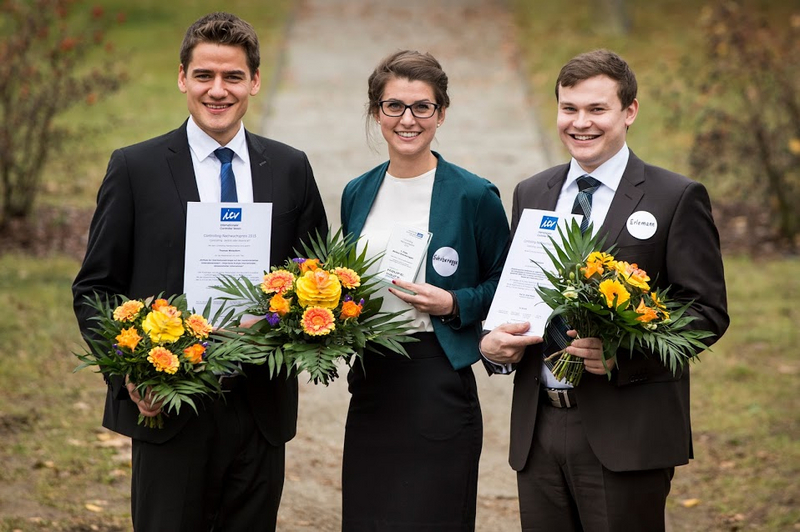
The International Association of Controllers (ICV) presented the 2015 Newcomer Award on Saturday (November 7) in Berlin. First place went to Dipl.-Ing. Bettina Schoberegger from the FH Joanneum in Graz. Second place was awarded twice, to: Thomas Weiszdorn (Friedrich Alexander University of Nuremberg) and Daniel Erlemann (Niederrhein University of Applied Sciences). The Award ceremony took place during the ICV Conference Controlling Innovation Berlin – CIB 2015 in Berlin-Adlershof.
Bettina Schoberegger’s winning thesis, “Conflicting objectives in working capital management – optimizing internal and external logistics processes through improved interaction”, was supervised by Prof. Dr. Martin Tschandl in Graz. Thomas Weiszdorn’s thesis, “Influence of distribution strategy on market-oriented company value – Empirical analysis of international, listed companies”, was supervised in Nuremberg by Professor Thomas M. Fischer.
Daniel Erlemann’s master thesis, “Development of a procedure for the appropriate consideration of energy costs within the framework of an energy management system in accordance with ISO 50001:2011 in small and medium-sized companies using the example of Frankenberg GmbH”, was supervised in Krefeld by Prof. Ulrich Nissen.
The winners were selected by a Jury headed by Prof. Dr. Ute Vanini, Kiel University of Applied Sciences, Department of Economics. The members of the Jury are Gerhard Radinger, Trainer CA Controller Akademie in Wörthsee near Munich, Dr. Hendrik Vater, CFO DHL Supply Chain Southern Europe, CFO Life Science & Healthcare Logistics DHL Supply Chain EMEA, member of the ICV Board of Trustees, and Ulrich Wilke, Berlin.
In her master thesis, the winner of the Newcomer Award deals with the optimization of companies’ working capital. Since an isolated optimization of working capital in individual functional areas can lead to negative effects along the supply chain, optimizations must be coordinated and the mutual effects on the supply chain must be taken into account. In working capital management, this can be achieved through a holistic approach that is coordinated with the processes along the entire supply chain. To achieve this, it is necessary to identify and analyze the factors influencing working capital and, in particular, their interactions. In her laudatory speech, the chair of the jury, Prof. Dr. Ute Vanini, emphasized that the winning work dealt with “a current and very relevant topic, as a reduced capital commitment contributes significantly to the profitability and liquidity of a company.”
In his master thesis, Thomas Weizdorn examines, for the first time according to the Jury, the influence of the distribution strategy on the market-oriented company value on the basis of a large international sample. The empirical analysis was able to show the positive influence of selected distribution strategies on short and long-term sales development and (excess) return development, but not on capital market performance.
The Jury praised Daniel Erlemann’s master thesis for its “comprehensive and structured treatment of a practically relevant issue.” The 2nd place winner had developed concrete and directly applicable solutions for an improved inclusion of energy costs in a company’s contribution margin accounting: “He has thus succeeded in transferring theory to practice in an outstanding manner.”
With the Newcomer Award, the ICV recognizes the achievements of young professionals who develop innovative scientific solutions for practical controlling problems during their studies. Their professors are also recognized because they maintain a practical focus in their teaching and research and support their students. “It is of great importance for controller practice that students not only deal with theoretical concepts and methods during their training, but also with their practical application,” says Prof. Vanini.
AwardThe Newcomer Award is endowed with a total of over 4,000 euros, with 2/3 of the prize money going to the student and 1/3 to the supervising chair. The Award, which has been given annually at the Controlling Innovation Berlin – CIB conference since 2005, is sponsored by Haufe Verlag and Haufe Akademie.
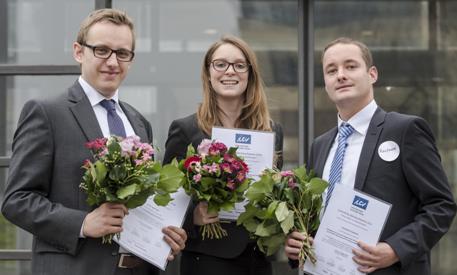
Newcomer Award winners 2014 (from left to right): Simon Redlinger, HS Aalen, 1st place; Claudia Lisa Weißmann, TU Darmsatdt, 3rd place; Christopher Kaufmann, HS Rosenheim, 2nd place.
On November 15, the three graduates were honored together with their supervising professors at the “14th Controlling Innovation Berlin – CIB 2014” conference. The 1st place winner, Simon Redlinger, presented his work to around 100 controlling experts in the CIB plenum. All three master theses honored this year deal with the area of conflict between controlling and technology and were written either in cooperation between the business and technology departments or at a technical university.
This year, the Haufe Group once again sponsored the Newcomer Award, which is endowed with over EUR 4,000.
1st place:
Simon Redlinger (Aalen University, supervised by Prof. Dr. Axel Löffler and Prof. Dr. Robert Rieg) worked on a very practice-relevant issue in his master thesis “Wind power profitability calculation – a system-dynamic analysis”, explained the Head of the Jury, Prof. Dr. Ute Vanini from Kiel University of Applied Sciences, in her laudatory speech. He used an extremely sophisticated method for modeling the diverse interactions in the generation of wind power. In addition, various scenarios were simulated and parameters varied as part of sensitivity analyses and their effects on the profitability of the wind turbines calculated. The Award winner thus demonstrates that even complex modeling and simulation methods can be applied directly in practice and offer significant added value in the analysis of the economic efficiency of wind turbines.
2nd place:
ner The second place winner, Christopher Kaufmann, supervised by Prof. Dr. Robert Ott and Prof. Dr. Oliver Kramer at Rosenheim University of Applied Sciences, was honoured for his master thesis “Determination of causation-based production hour rates for the correct valuation of inventories according to BilMoG” (German Accounting Law Modernization Act). The Jury praised the comprehensive and structured treatment of a practically relevant issue. Concrete and directly applicable solutions were developed for improving the causal fairness of the production hour rates for a practical company. The winner thus succeeded in “transferring theory to practice in an outstanding manner”.
3rd place:
The 3rd place winner in 2014 is Claudia Lisa Weißmann from TU Darmstadt, supervised by Prof. Dr. Reiner Quick and Prof. Dr. Anette von Ahsen. Her master thesis is entitled: “Analysis of the use of life cycle costing and life cycle assessment for efficiency houses”. The winner took up a relevant question, analyzed it using a scientific methodology (life cycle costing) and presented her approach and results in a comprehensible manner. Overall, the work was pleasing due to its comprehensive evaluation of the literature.
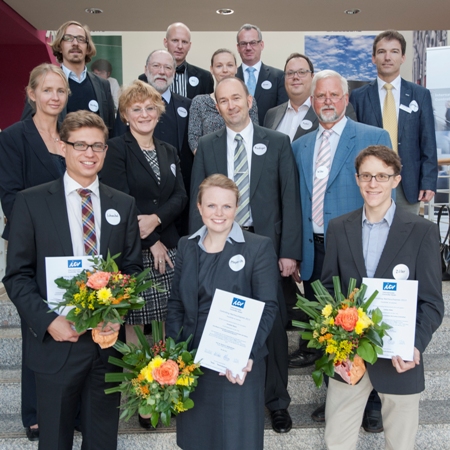
First place was awarded to Christopher Scheubel, Technical University of Munich, for his diploma thesis (pictured front left). The thesis, supervised by Prof. Dr. Gunther Friedl and Dr. Sabine Pallas, entitled “Corporate Social Responsibility and Financial Performance in the Automotive Industry – Do Social and Environmental Outperformers also outpace financially?” examines the question of whether social responsibility and sustainability measures are also financially worthwhile for companies. The jury considered it particularly worthy of an Award that the work deals with a relevant and current topic: the significance of corporate social responsibility (CSR) for controlling. It makes “a fundamental contribution here, because if CSR activities have a positive influence on the financial success of a company, they must also be managed and thus controlled”, according to the laudatory speech by the head of the jury, Prof. Dr. Ute Vanini from Kiel University of Applied Sciences. In addition to its linguistic conciseness, the work impresses with its extremely well-founded research design and its scientifically clean and ambitious implementation. The author has succeeded in presenting a challenging topic in a clear and understandable way and deriving implications for management.
The 2nd place went to Tobias Zöller from the Technical University of Darmstadt. He was supervised by Prof. Dr. rer. pol. Reiner Quick and Prof. Dr. Anette von Ahsen with his thesis “Critical analysis of approaches to carbon controlling”. The bachelor thesis was selected by the jury because carbon controlling is still a relatively young, current, important and complex topic for the controller community. On the basis of a comprehensive international literature review, Zöller provides a structured and critical overview of the various approaches to carbon controlling, according to the Jury.
The Jury awarded 3rd place to Christine Meyer from Justus Liebig University Giessen. Her master thesis, supervised by Prof. Dr. Barbara E. Weißenberger, is entitled: “The effects of information presentation on the base-rate fallacy: An experimental approach”. The author deals with the misjudgement of conditional probabilities of certain events. Based on experiments, she investigates how different report formats in the form of texts, graphics and tables influence the occurrence of these misjudgements. Head of the Jury Prof. Vanini emphasizes that this results in “valuable implications for controller practice for the design of reports and the presentation of information”. “In addition to the significance of the content, the high scientific quality of the work is also particularly worthy of the Award,” says the Head of the Jury.
Developing controlling for practical use
The ICV presented the Newcomer Award for the 9th time at the “Controlling Innovation Berlin – CIB 2013” conference. As the leading European association of controlling practitioners, the ICV disseminates the ideas of controlling and develops them further for practical application. “To achieve this, we need to stimulate new ideas and collaborate with universities and other educational institutions,” says Prof. Dr. Ute Vanini, explaining the main objectives associated with the idea of the Newcomer Award. “With the Award, we want to recognize the achievements of young talents who develop innovative scientific solutions for practical controlling problems during their studies. Their professors also deserve our recognition because they cultivate practical relevance in their teaching and research and support their students as sparring partners and supervisors. It is of great importance for controller practice that students not only deal with theoretical concepts and methods during their training, but also with their practical application.”
JThe eleven theses submitted included a colorful mix of classic and new controlling topics. The Jury, headed by Prof. Dr. Ute Vanini with Gerhard Radinger, trainer at the Controller Akademie, Ulrich Wilke, Dr. Hendrik Vater, CFO DHL Supply Chain Southern Europe, CFO Life Science & Healthcare Logistics DHL Supply Chain EMEA, ICV Board of Trustees member, was delighted with the increasing internationalization. After all, the scientific advancement of controlling can only take place in accordance with international standards. The jury makes its decisions based on four criteria: scientific basis, practical relevance, feasibility and degree of innovation.
Sponsored by Haufe Verlag and Haufe Akademie, the Newcomer Award is endowed with a total of 4,050 euros. In addition to the cash prizes, the winners receive a free one-year membership of the ICV and a free one-year subscription to Controller Magazin, the most successful and highest-circulation controlling magazine in Germany.
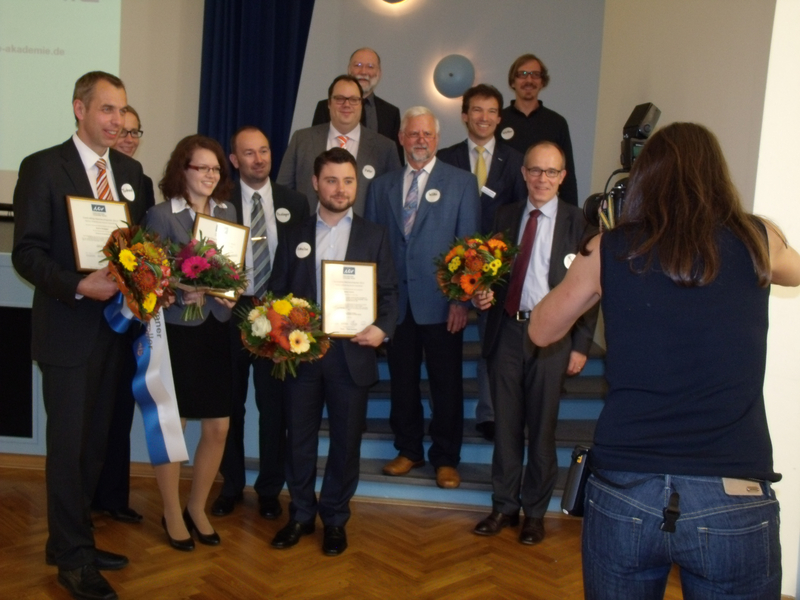
The 2012 Newcomer Award goes to Sabine Rossegger, FH Joanneum Kapfenberg, for her diploma thesis “Modern Budgeting – Adequate IT Support for Practical Implementation”, 2nd place goes to Robert Schulze from the Berlin School of Economics and Law for his master thesis “Designing principles and success factors for the conception of management performance dashboards for sales companies – A case study on Biotronik”, 3rd place goes to Slavomira Podluckà from the FH Westküste in Schleswig-Holstein for her bachelor thesis “Framing in Reporting”. The International Association of Controllers’ (ICV) Newcomer Award was presented for the eighth time on October 27 at the “Controlling Innovation Berlin – CIB 2012” conference.
The Jury, headed by Prof. Dr. Ute Vanini, Vice Dean and Professor of Controlling at Kiel University of Applied Sciences, with Dr. Hendrik Vater (DHL), Ulrich Wilke (retired controller) and Gerhard Radinger (Controller Akademie CA), made its decision from twelve entries from universities in three countries (D, A, CH). The decisive criteria were scientific foundation, practical relevance of the issue, direct practicability of the developed recommendations for action and the degree of innovation of the work.
JWinners 2012 from Kapfenberg, Berlin and Heide (Schleswig-Holstein)
The 1st place was awarded to Sabine Rossegger, FH Joanneum Kapfenberg (Austria). The topic of the winning thesis 2012, supervised by Prof. Dr. Martin Tschandl, is: “Modern Budgeting – Adequate IT Support for Practical Implementation”. The Jury Chairwoman, Prof. Vanini, reported a “very clear winner”: “I have rarely experienced such unity in the jury’s decision, which speaks for the consistently excellent quality of the work.”
“The work deals with an extremely relevant and complex topic for practice, as planning and budgeting processes take up a lot of time in companies,” said the Jury Chairwoman, explaining the decision. “Building on the International Association of Controllers’ concept of ‘modern budgeting’, Ms. Rossegger argues that high-quality but also efficient budgeting can only be achieved with appropriate IT support and develops a process model including an evaluation approach for software selection.” In doing so, she achieved a “balancing act between a scientifically sound derivation and a clear presentation of the model in an outstanding manner”. The approach developed in the winning paper “can serve as a basic model for IT support and can be adapted and simplified by companies to suit their specific needs,” is the conclusion.
Second place was awarded to Robert Schulze from the Berlin School of Economics and Law. In his master thesis, “Designing principles and success factors for the conception of management performance dashboards for sales companies – A case study on Biotronik”, the author “dealt with a relevant topic in a comprehensible and structured manner and presented it clearly”, according to the jury. He has developed a concrete company-specific solution for a performance management dashboard, whereby the approach and the basic structure of the dashboard can be easily transferred to other companies.
Third place was awarded to Slavomira Podluckà from the West Coast University of Applied Sciences in Schleswig Holstein. Her work on “Framing in reporting” was the first time that the Jury included a bachelor thesis among the Award-winning works. Framing is about the content, structure and linguistic design of reports and the resulting intended and unintended effects on the perception and decisions of report readers. “With her thesis, Ms. Podlucká examines a very relevant, albeit previously little-noticed topic from controlling practice very clearly using numerous examples and also derives some recommendations for action,” said the ICV ury.
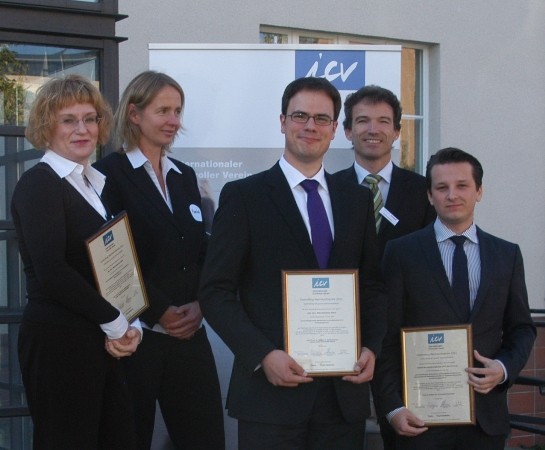
(Picture: After the presentation of the Newcomer Award 2011 in Berlin, from left to right: Prof. Dr. Barbara E. Weißenberger, Justus Liebig University Giessen; Prof. Dr. Ute Vanini, Kiel University of Applied Sciences, ICV Jury Chairwoman; Sebastian Göbel, 2nd place, Justus Liebig University Giessen; Günther Lehmann, Haufe-Verlag; Karl Krziwon, 1st place, Rosenheim University of Applied Sciences).
The 1st place, endowed with EUR 2,500, goes to Karl Krziwon from Rosenheim University of Applied Sciences. His work, written in collaboration with BMW, is entitled: “Development of a model for the systematic collection of factor prices for calculation models for the cost structure analysis of vehicle components”. With its decision, the ICV Jury recognized the sophisticated but practicable model developed in this work for decision support in the selection of data for costing models in the automotive industry.
The second place, endowed with EUR 1,500, goes to Sebastian Göbel from Justus Liebig University Giessen for his work “Controlling-oriented design of incentive systems in crisis situations”. According to the ICV Jury, the author has dealt with a very relevant topic in a structured and comprehensive manner and derived general recommendations for the crisis-oriented design of incentive systems.
The International Association of Controllers (ICV) has been awarding the “Newcomer Award” every year since 2005 with the aim of promoting young controllers and making innovative and practicable ideas accessible to a wide range of controllers. Two thirds of the prize money is paid to the winner and one third to the supervising university lecturer.
The “Controlling Innovation Berlin” (CIB) is a specialist conference organized by the regional ICV Work Group Berlin, Berlin-Brandenburg, Franconia, Mecklenburg-Western Pomerania, Saxony, Thuringia and Weser-Harz. Every year, controlling practitioners, managers, consultants, academics and students meet at WISTA Management GmbH in Berlin-Adlershof for the CIB. The motto of the CIB 2011, “Controlling is (also) communication”, underlined the claim of the organizing International Association of Controllers (ICV) to sustainable controlling. This approach sees controlling as a management process that can only be effective if controllers and managers work together.
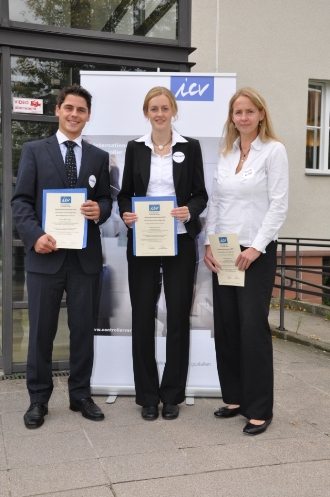
20th Newcomer Award winners Martin Petschnig (3rd place) and Kathrin Moormann (1st place) with their professor Dr. Ute Vanini.
Kiel University of Applied Sciences, the University of Regensburg and FH Joanneum Kapfenberg (Austria) have been awarded the International Association of Controllers’ (ICV) 2010 Newcomer Award.
The Newcomer Award winners were honored at the “10th Controlling Innovation Berlin CIB 2010” symposium on Saturday (September 18). Kathrin Moormann from Kiel University of Applied Sciences presented her 1st Award-winning work on the “Systematization of Risk Identification” in the plenary session.
The decisive factor for the Jury’s decision was the development of concrete, application-oriented, innovative solutions and recommendations for action for companies, which should be of high practical relevance for controlling. The members of this year’s Jury were Prof. Dr. Ute Vanini (Chairwoman), Dr. Klaus Eiselmayer, Ulrich Wilke and Dr. Hendrik Vater.
The 2010 Newcomer Award winners are:
1st place, endowed with EUR 2,250: Kathrin Moormann, Kiel University of Applied Sciences: “Systematization of risk identification in the Dräger Group – development of a risk catalog and further approaches”;
2nd place, endowed with EUR 1,200: Bettina Karl, University of Regensburg: “From input to output orientation using the example of the event department of the
HypoVereinsbank”;
3rd place, endowed with EUR 600: Martin Petschnig, FH Joanneum Kapfenberg: “Controlling customer integration – creating a controlling concept in the context of mass customization and open innovation”.
The aim of the ICV Newcomer Award, presented for the 6th time, is to promote young controllers and make innovative ideas accessible to a wide range of controllers. The Award money sponsored by Haufe Verlag is distributed 2/3 to the authors and 1/3 to the supervising chair or professorship. An annual membership in the International Association of Controllers, which also includes a subscription to the “Controller Magazin”, is a further component of the Award.
Kiel University of Applied Sciences, the University of Regensburg and FH Joanneum Kapfenberg (Austria) have been awarded the International Association of Controllers’ (ICV) 2010 Newcomer Award.
The Newcomer Award winners were honored at the “10th Controlling Innovation Berlin CIB 2010” symposium on Saturday (September 18). Kathrin Moormann from Kiel University of Applied Sciences presented her 1st Award-winning work on the “Systematization of Risk Identification” in the plenary session.
The decisive factor for the Jury’s decision was the development of concrete, application-oriented, innovative solutions and recommendations for action for companies, which should be of high practical relevance for controlling. This year’s Jury consisted of Prof. Dr. Ute Vanini (Chairwoman), Dr. Klaus Eiselmayer, Ulrich Wilke and Dr. Hendrik Vater.
The 2010 Newcomer Award winners are:
1st place, endowed with EUR 2,250: Kathrin Moormann, Kiel University of Applied Sciences: “Systematization of risk identification in the Dräger Group – development of a risk catalog and further approaches”;
2nd place, endowed with EUR 1,200: Bettina Karl, University of Regensburg: “From input to output orientation using the example of HypoVereinsbank’s events department”;
3rd place, endowed with EUR 600: Martin Petschnig, FH Joanneum Kapfenberg: “Controlling customer integration – creating a controlling concept in the context of mass customization and open innovation”.
The aim of the ICV Newcomer Award, presented for the 6th time, is to promote young controllers and make innovative ideas accessible to a wide range of controllers. The Award money sponsored by Haufe Verlag is distributed 2/3 to the authors and 1/3 to the supervising chair or professorship. An annual membership in the International Association of Controllers, which also includes a subscription to the “Controller Magazin”, is a further component of the Award.
Christian Ludwig: Conception of a key figure system for the production area to qualify controlling in metal construction using the example of Yue Hui Enterprise Shanghai.
The Jury

Chairman
General Business Administration, esp. Internal Accounting and Controlling
ESB Reutlingen Business School Controlling and Corporate Management

Head of Group Controlling
Deutsche Bahn AG
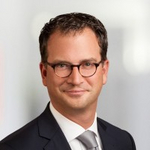
Partner
CTcon GmbH, Düsseldorf
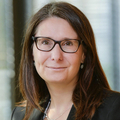
Head of Group Controlling
ALTANA AG

Business Accounting
Berlin School of Economics and Law, Berlin
Cooperation Partners

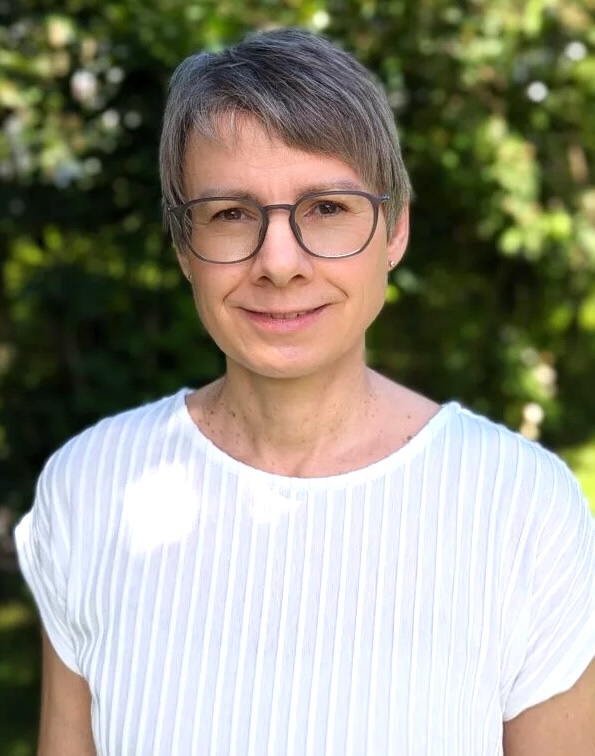
Your contact person
Please send your complete application to the ICV Office, Stephanie Wirth. She is also available to answer your questions.
Stephanie Wirth
Münchner Straße 8
D-82237 Wörthsee
Phone: +49 (0) 8153 88974-20
E-mail: nca@icv-controlling.com
You are currently viewing a placeholder content from YouTube. To access the actual content, click the button below. Please note that doing so will share data with third-party providers.
More Information
LucaNet AG
Ob einzeln oder in beliebigen Kombinationen – die Software-Lösungen der LucaNet AG werden auf die individuellen Ansprüche und Bedürfnisse der Kunden abgestimmt.
Das Software-Portfolio umfasst folgende Produkte:
– LucaNet.Financial Consolidation – für legale und ManagementKonsolidierung
– LucaNet.Planner – für transparente Planung und effizientes Controlling
– LucaNet.Kommunal – für den einfachen und prüfungssicheren Gesamtabschluss
– LucaNet.E.Bilanz – für sichere Erstellung und Übermittlung der E-Bilanz
– LucaNet.Importer – für schnellen Datentransfer
– LucaNet.Group Report – für effektive Erfassung und Validierung von Daten
– LucaNet.Equity – für effizientes Beteiligungscontrolling
Der Hauptsitz der LucaNet AG liegt in Berlin, weitere Standorte befinden sich in West- und Süddeutschland. International ist das Unternehmen in Österreich, der Schweiz, den Niederlanden, Belgien, der Ukraine und China vertreten.
Fachliche Beratung und Schulungen zu den LucaNet-Produkten ergänzen das Software-Portfolio. Die LucaNet Academy GmbH, eine Tochter der LucaNet AG, bietet praxisorientierte Seminare und Weiterbildungen im Rechnungswesen an.
E-Mail:
info@lucanet.de

